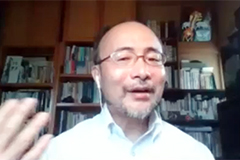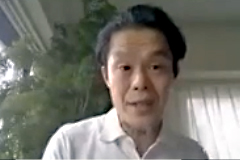A Better World Through Data, Based on Value, Equality and Trust: Seminar on World Development Report 2021 Is Held
2021.10.11
World Development Report (WDR) is published annually by the World Bank Group and the 2021 edition of "WDR 2021: Data for Better Lives" was released in March 2021. In response to the release, the World Bank and the JICA Ogata Sadako Research Institute for Peace and Development (JICA Ogata Research Institute) jointly held an online seminar on July 27, 2021.
After opening remarks by Miyazaki Masato, the special representative of the World Bank in Japan, two WDR 2021 co-directors—Dean Jolliffe, lead economist at the Development Data Group of the World Bank, and Vivien Foster, chief economist for the Infrastructure Vice-Presidency at the World Bank—gave a summary of the report.
First, to provide an overview of the WDR2021, Jolliffe stated that while data has the positive power to address problems like poverty and disasters and make contributions to public policy, data gaps still exist in terms of data infrastructure, access and regulation. That is why, he said, states need to implement a new social contract with their citizens concerning the use of data, based on the three elements of value, equity, and trust. In addition, he noted that the report introduced Statistical Performance Indicators (SPI), a new tool to measure the performance of national statistical systems and identify areas for improvement. He said that SPI discussion is one example of the way in which we need to improve trust in the performance of data. He continued to say that SPI is a tool for improving transparency and is one part of building up social contract.

Dean Jolliffe, lead economist at the Development Data Group of the World Bank

Vivien Foster, chief economist for the Infrastructure Vice-Presidency at the World Bank
Foster then gave an in-depth explanation of data governance, a framework to enforce the social contract, which is brought up in the latter half of the report. She looked at each of the four pillars of data governance: infrastructure policies, laws and regulations, economic policies, and institutions, from both a domestic and international dimensions. She said that the data governance is not just a matter of national policymaking but has a crucial element of international cooperation. In order to implement that framework, Foster emphasized the need to build an integrated national data system, which is built on a whole-of-government approach with strong coordination among governing entities as well as active engagement with multi-stakeholders across economies.
In his comments responding to the WDR 2021, Makino Koji, the director general of the JICA Ogata Research Institute, observed that the WDR 2021 is a timely report, as the novel coronavirus (hereafter, COVID-19) pandemic has revealed both benefits and risks of data use, and that data is also indispensable for achieving human security. Moreover, he mentioned that since 2020, JICA has been conducting dialogues with many researchers regarding the post-COVID-19 world, and we have come to the conclusion that COVID-19 is accelerating movements to restructure social contracts around the world. JICA believes that safety, prosperity, and freedom are the vital core of the social contract, and this does not contradict with what the WDR 2021 is aiming for, he said. In addition, he touched on making use of data for peacebuilding. Armed anti-government forces are spreading extremism through social media, and society is becoming more radicalized, fragmented and polarized, even in the virtual world. In light of this, he said we must also use social media and digital transformation to create a single, greater society; being able to reach each and every individual will help promote peacebuilding. As examples, he cited JICA’s moves to use big data from smartphones, social media data and satellite data in providing support for the Philippine island of Mindanao and refugees in Uganda, which show the further potential of a data society.

Makino Koji, the director general of the JICA Ogata Research Institute
This was followed by comments from Ito Seiro, director, Microeconomic Analysis Studies Group, Development Studies Center, JETRO-Institute of Developing Economies. He began by saying that the WDR2021 is impressive in that it put the issue of information at the forefront and proposes a framework for data governance, citing digital loans in Africa as an example of the benefits that a digital society can bring to the poor. However, he also raised the issue of feasibility, questioning how we can build a social contract under a limited trust while protecting the poor. He also pointed out that there are costs to data driven economy even if data usage complies with the social contract.

Ito Seiro, director, Microeconomic Analysis Studies Group, Development Studies Center, JETRO-Institute of Developing Economies
Finally, each speaker responded to questions from the participants, such as “Are there measures we can take to prevent data abuse?" and "How can we involve vulnerable groups in the process of using data?" and a lively exchange of opinions took place.
Seminar "World Development Report 2021: Data for Better Lives"

事業事前評価表(地球規模課題対応国際科学技術協力(SATREPS)).国際協力機構 地球環境部 . 防災第一チーム. 1.案件名.国 名: フィリピン共和国.

事業事前評価表(地球規模課題対応国際科学技術協力(SATREPS)).国際協力機構 地球環境部 . 防災第一チーム. 1.案件名.国 名: フィリピン共和国.

事業事前評価表(地球規模課題対応国際科学技術協力(SATREPS)).国際協力機構 地球環境部 . 防災第一チーム. 1.案件名.国 名: フィリピン共和国.

事業事前評価表(地球規模課題対応国際科学技術協力(SATREPS)).国際協力機構 地球環境部 . 防災第一チーム. 1.案件名.国 名: フィリピン共和国.

事業事前評価表(地球規模課題対応国際科学技術協力(SATREPS)).国際協力機構 地球環境部 . 防災第一チーム. 1.案件名.国 名: フィリピン共和国.
scroll